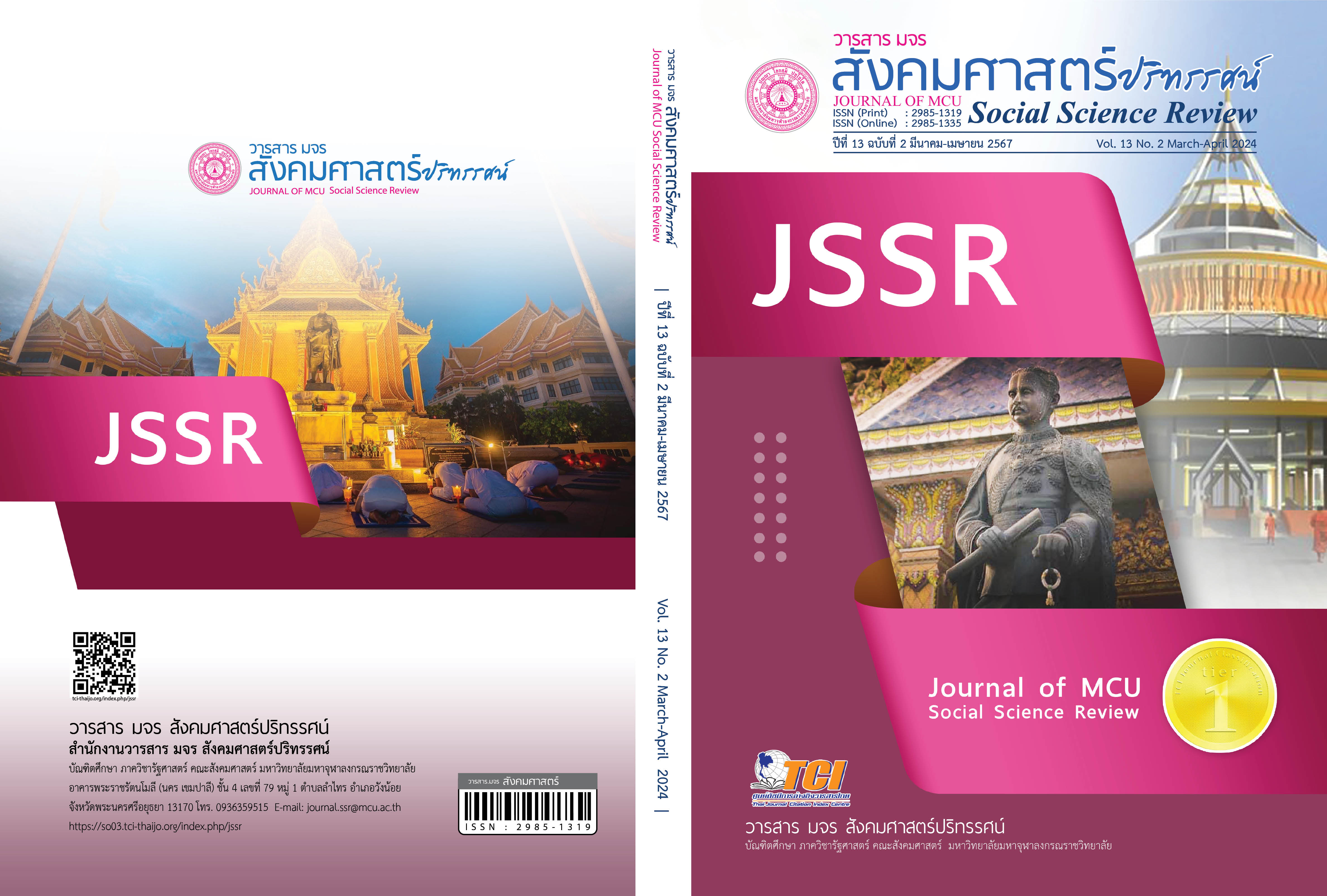ศาสตร์พระราชาและปัจจัยพลังอำนาจของชาติส่งผลต่อ การแก้ไขปัญหาจังหวัดชายแดนภาคใต้
คำสำคัญ:
ศาสตร์พระราชา, ปัจจัย, พลังอำนาจของชาติบทคัดย่อ
บทความวิจัยนี้มีวัตถุประสงค์ 1. เพื่อศึกษาเกี่ยวกับศาสตร์พระราชาในการพัฒนาพื้นที่ตามภูมิศาสตร์ 2. เพื่อศึกษาปัจจัยพลังอำนาจของชาติที่มีผลต่อการพัฒนาและนำไปสู่การแก้ไขปัญหาจังหวัดชายแดนภาคใต้ และ 3. เพื่อนำเสนอแนวทางการน้อมนำศาสตร์พระราชาและปัจจัยพลังอำนาจของชาติ ไปประยุกต์ใช้ในการพัฒนาและแก้ไขปัญหาจังหวัดชายแดนภาคใต้ ซึ่งเป็นการวิจัยเชิงคุณภาพ โดยใช้แบบสัมภาษณ์เป็นเครื่องมือในการเก็บรวบรวมข้อมูลกับกลุ่มผู้ให้ข้อมูลสำคัญ ได้แก่ ผู้บริหารองค์กรปกครองส่วนท้องถิ่น ผู้นำท้องที่ ผู้นำทางศาสนา
ผู้นำชุมชน บุคลากรด้านการศึกษา บุคลากรด้านสาธารณสุข ปราชญ์ชาวบ้าน เจ้าหน้าที่รัฐผู้ปฏิบัติงานในโครงการสำคัญ (ศอ.บต.) และประชาชนในพื้นที่ จำนวน 60 คน ด้วยวิธีการแบบเจาะจง
ผลการวิจัยพบว่า การแก้ไขปัญหาจังหวัดชายแดนภาคใต้ต้องน้อมนำศาสตร์พระราชา เข้าใจ เข้าถึง พัฒนาและหลักปรัชญาของเศรษฐกิจพอเพียง มาเป็นแกนกลางในการขับเคลื่อน โดยอาศัยปัจจัยพลังอำนาจของชาติมาประยุกต์ใช้ในการพัฒนาเชิงพื้นที่ ด้วยการเข้าใจและใช้จุดแข็งของความหลากหลายทางด้านภูมิประเทศ จารีตประเพณีและวัฒนธรรม ขับเคลื่อนและพัฒนาพื้นที่ตามศักยภาพทางด้านภูมิศาสตร์ สร้างและรักษาอัตลักษณ์พื้นถิ่นการท่องเที่ยวให้เป็นที่รู้จัก นำวิทยาศาสตร์และเทคโนโลยีที่ทันสมัยมาพัฒนาการผลิตในภาคการเกษตรสร้างเศรษฐกิจฐานราก ตลอดจนการสร้างความเชื่อมั่นของประชาชนในพื้นที่ เปิดเวทีรับฟังความคิดเห็น ปฏิบัติต่อทุกคนในพื้นที่ด้วยความเสมอภาคเท่าเทียมกัน เป็นธรรม และไม่เลือกปฏิบัติ ซึ่งจะทำให้ประชาชนเกิดความรู้สึกและอยากมีส่วนร่วมแก้ไขปัญหาร่วมกันมากขึ้น
เอกสารอ้างอิง
กองนโยบายและแผน. (2560). ยุทธศาสตร์ชาติ พ.ศ. 2561 – 2580 (ฉบับย่อ). สืบค้น 2 กุมภาพัน 2566, จาก https://shorturl.asia/RPSaV
จามรี พระสุนิล. (2562). ย้อนรอยพระบาทที่ยาตรา เรียนรู้สู่ศาสตร์พระราชา. วารสาร อิเล็กทรอนิกส์ Veridian มหาวิทยาลัยศิลปากร (มนุษยศาสตร์สังคมศาสตร์และศิลปะ), 36(3), 1-38.
นิรุจ ดวงปัญหา และคณะ. (2562). อนาคตทิศทางการแก้ปัญหา 3 จังหวัดชายแดนใต้. กรุงเทพฯ: สถาบันวิชาการป้องกันประเทศ.
สถานวิจัยความขัดแย้งและความหลากหลายทางวัฒนธรรมภาคใต้. (2565). ชายแดนใต้/ปาตานี 2547-2564: ก้าวเข้าปีที่สิบเก้า สันติภาพจะเดินหน้าไปถึงไหนในปี 2565?. สืบค้น 2 กุมภาพัน 2566, จาก https://cscd.psu.ac.th/th/node/357
สำนักงานสภาพัฒนาการเศรษฐกิจและสังคมแห่งชาติ. (2562). แผนแม่บทภายใต้ยุทธศาสตร์ชาติ (1) ประเด็นความมั่นคง (พ.ศ. 2561 - 2580). สืบค้น 2 กุมภาพันธ์ 2566, จาก https://shorturl.asia/x8gZp
สิทธิพร มุสิกะสิน. (2561). รูปแบบการพัฒนาพื้นที่ภาคใต้ตอนล่าง (3 จังหวัดชายแดนใต้) ตาม แนวยุทธศาสตร์การพัฒนาภูมิสังคมเศรษฐกิจอย่างยั่งยืน (รายงานการวิจัย). กรุงเทพฯ: วิทยาลัยป้องกันราชอาณาจักร.
อธิภัทร บัวหลวง. (2551). ผลกระทบจากวิกฤตการณ์ 3 จังหวัดชายแดนภาคใต้ ที่มีต่อเศรษฐกิจชุมชน : ศึกษาเฉพาะกรณีชุมชน อำเภอเมือง จังหวัดปัตตานี. วารสารรูสมิแล, 40(1), 95-99.
อภิวัฒน์ สมาธิ และคณะ. (2563). ความคาดหวังของประชาชนต่อแนวทางการเสริมสร้างสันติสุขและความสมานฉันท์โดยองค์กรปกครองส่วนท้องถิ่นในพื้นที่จังหวัดชายแดนภาคใต้. วารสารปาริชาติ, 33(2), 47-65.
Morgenthau, H.J. (1973). Politics among Nations: The Struggle for Power and Peace (5 Ed). New York: Adfred-A-Knopt.
TIJ Thailand Institute of Justice affiliated with the United Nations. (2024). National agend Driving the rule of law to lead Thailand. Retrieved January 25, 2024, from https://shorturl.asia/XTvQ8
ดาวน์โหลด
เผยแพร่แล้ว
รูปแบบการอ้างอิง
ฉบับ
ประเภทบทความ
สัญญาอนุญาต
ลิขสิทธิ์ (c) 2024 วารสาร มจร สังคมศาสตร์ปริทรรศน์

อนุญาตภายใต้เงื่อนไข Creative Commons Attribution-NonCommercial-NoDerivatives 4.0 International License.
เพื่อให้เป็นไปตามกฎหมายลิขสิทธิ์ ผู้นิพนธ์ทุกท่านต้องลงลายมือชื่อในแบบฟอร์มใบมอบลิขสิทธิ์บทความให้แก่วารสารฯ พร้อมกับบทความต้นฉบับที่ได้แก้ไขครั้งสุดท้าย นอกจากนี้ ผู้นิพนธ์ทุกท่านต้องยืนยันว่าบทความต้นฉบับที่ส่งมาตีพิมพ์นั้น ได้ส่งมาตีพิมพ์เฉพาะในวารสาร มจร สังคมศาสตร์ปริทรรศน์ เพียงแห่งเดียวเท่านั้น หากมีการใช้ภาพหรือตารางหรือเนื้อหาอื่นๆ ของผู้นิพนธ์อื่นที่ปรากฏในสิ่งตีพิมพ์อื่นมาแล้ว ผู้นิพนธ์ต้องขออนุญาตเจ้าของลิขสิทธิ์ก่อน พร้อมทั้งแสดงหนังสือที่ได้รับการยินยอมต่อบรรณาธิการ ก่อนที่บทความจะได้รับการตีพิมพ์ หากไม่เป็นไปตามข้อกำหนดเบื้องต้น ทางวารสารจะถอดบทความของท่านออกโดยไม่มีข้อยกเว้นใดๆ ทั้งสิ้น





